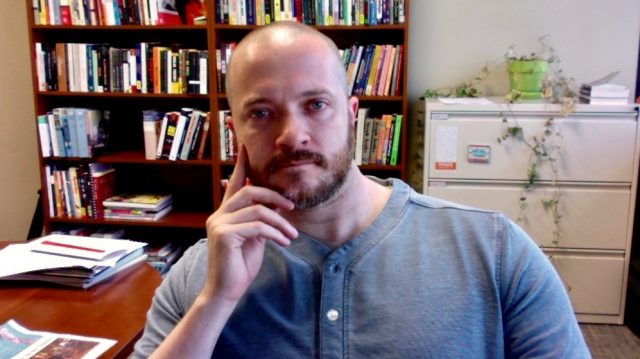
Sociology professor James Thomas is using a National Science Foundation grant to examine how white Southerners are making sense of what it means to be white today. Submitted photo
OXFORD, Miss. – A University of Mississippi sociology professor is studying how white people in the South are managing the wide-scale social, economic and political shifts of the 21st century.
Funded by a National Science Foundation grant, sociology professor James M. Thomas’ study will help advance the understanding of how white Southerners – a group often characterized as a monolith – are making sense of what it means to be white today.
“In a nutshell, I’m interested in studying what I term ‘whiteness in crisis,'” said Thomas, an associate professor. “The historian Nell Irvin Painter, in ‘The History of White People,’ remarks that ‘Being white these days is not what it used to be.’
“Painter’s observation is, in part, rooted in these shifts that have both solidified white people’s material advantages, while at the same time called into question the underlying ideology of their dominant group status in the United States.
“My research will focus on how white people living in the American South who have come of age amidst these shifts – those between the ages of 18 and 35 – make sense of the American racial hierarchy today, and their place within it.”
By illuminating how white Southerners understand their position within the American racial hierarchy and by identifying the contexts and experiences that shape white Southerners’ understanding of this racial hierarchy and their place in it, the study offers a response to growing demands for antiracist education, Thomas said.
The NSF award will fund two graduate students for two years to work on the study, which will interview around 150 white Southerners in the 18-to-35 age group in two places: a large, urban city and a mostly rural space. The study involves a short survey being distributed to a few thousand households and then building a pool of potential interviewees from the responses.
The funding also will help provide in-depth training for both graduate and undergraduate students in qualitative research design, methodology and analysis.
“We’re very proud of Dr. Thomas for this remarkable achievement,” said Jeff Jackson, chair of the Department of Sociology and Anthropology. “Dr. Thomas is a nationally renowned scholar of race in American and this research study will only strengthen his reputation as a leader in his field.
“It’s also a great opportunity for students in our program to become involved in pioneering research supported by the National Science Foundation. It’s a good time to be a sociology or anthropology major at the University of Mississippi.”
Thomas’ award is the third research grant from the NSF received by the department in the past four years, Jackson said. This shows the department is becoming more successful at attracting external funding for research.
While the external funding reflects the quality of the department’s research faculty, the increase in external funding also benefits students through additional support and training.
“As an R1 institution, faculty are expected to be leaders in their academic fields and promote research among our students,” said Lee Cohen, dean of the College of Liberal Arts. “This award recognizes Dr. Thomas as a faculty member who is doing cutting-edge research which directly impacts our students and will ultimately set them apart from their competitors as they move forward in their careers.”
Students in Thomas’ Ole Miss class on race in the 21st century have been conducting pilot interviews for the past two years, but the NSF funding allows for an expansion of the study, including the first step of building the study’s sample, which will start immediately.
“Students in that class are going to get hands-on training in research design and methodology, and they’re going to participate in the collection and analysis of the data for this project, along with the graduate students who will be assisting me,” Thomas said. “Not only will this facilitate the development of concrete research skills, but it will also help facilitate the STEM pipeline within sociology, especially for students from historically underrepresented groups.
“When I teach the course in the spring, the first several weeks will be spent training the students on research design and how to conduct interviews. If all goes well, we’ll hopefully be able to hit the ground running with interviews sometime in March and April.”
With sociology providing a set of tools that can help students better understand the world, students are better at using those tools when they are given opportunities to wield them, Thomas said.
“It’s one thing to talk to students about social scientific data on racism; it’s another to show them how to collect and analyze that data so they understand how all of the pieces fit together and how to make sense of what they see,” he said.
But working with students directly in a study such as this also creates a needed interaction between his teaching and research, Thomas said, since the two faculty functions inform each other.
“I find it more challenging to move between the two if I cannot clearly see the relationship they have to one another,” he said. “So, incorporating students into my research as assistants helps me meet this practical aim of mine.”
Once the in-depth interviews are collected and analyzed, the findings will be published.
“Many of the findings will be published in traditional academic outlets since the goal here is to advance knowledge and understanding,” Thomas said.
“But, as with nearly all of my research to date, I will look for opportunities to communicate the research findings to wider, public audiences. This will take place through public presentations and more popular writings with mainstream outlets.”
The project, titled “Group Identification Under Stress: A Comparative Study,” is funded through the NSF’s Division of Social and Economic Sciences.
Funded for $299,608 over two years, the award, No. 2115147, has an estimated end date of Aug. 31, 2023.